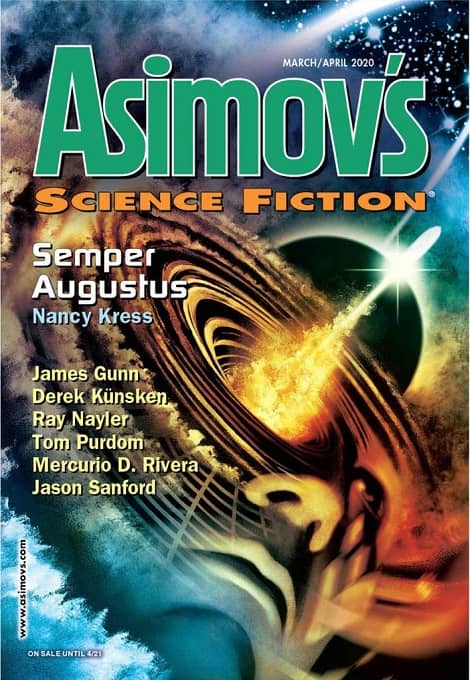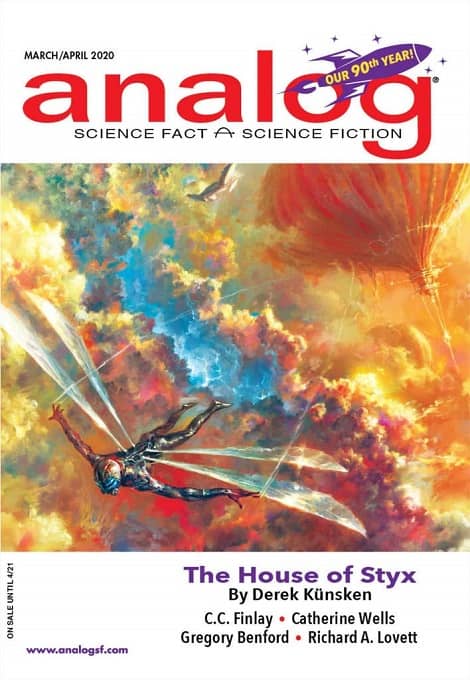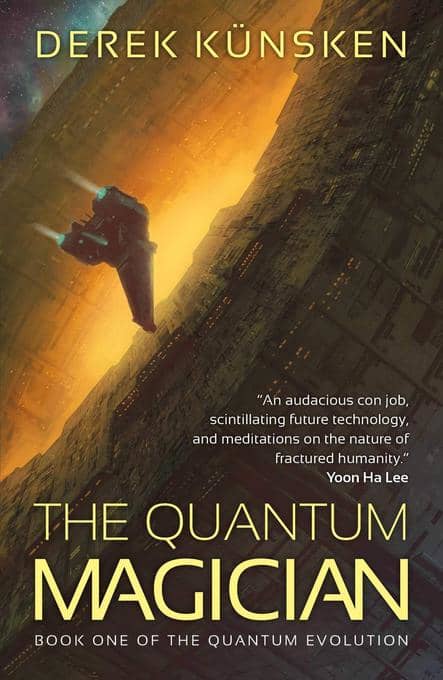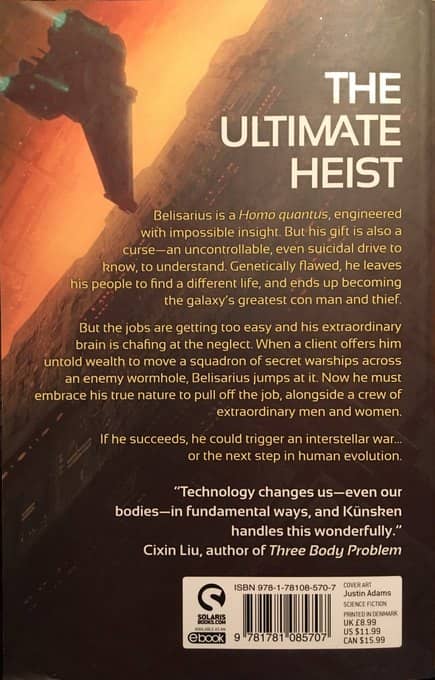Write Your Legislators: Dell Science Fiction Reviews
 |
 |
Warning: Minor Spoilers Ahead!
My copies of Asimov’s Science Fiction and Analog Science Fact & Science Fiction arrived in the mail on the same day. Consequently, I wondered what to read first. I perceived that Black Gate’s very own Derek Kunsken had something in Asimov’s, but he also did in Analog. In Analog, his contribution was much longer, a serial, the beginning of a novel.
For whatever reason, or none, I began with Asimov’s. I noticed that the topic of the guest editorial serendipitously is what I myself wrote about last review: the sometimes tense relationship between science fiction and fantasy (though David D. Levine’s “Thoughts on a Definition of Science Fiction” deemphasizes this tension while addressing it, briefly, at the very end of the article). It’s well worth reading. In short, Levine arrestingly says that (to compress the entire discussion) “Technology [science fiction] depends on what you have; magic [fantasy] depends on who you are.” I’ve never before encountered the differences between the two genres explained in quite this way.
I’d say that there were two standout stories in this Asimov’s. Since I’m still fairly new to reviewing these, I should remind readers that my callouts are contingent on my idiosyncratic interests and sensibilities. If I were to characterize what science fiction stories most often excite me, I’d settle on those that (in addition to all of the qualities that make for all good writing, fictional or otherwise) contain philosophical or metaphysical concepts that startle my presumptions.
The novelette “Beyond the Tattered Veil of Stars,” by Mercurio D. Rivera, is one of these. Get this: a scientific genius creates a virtual world within a virtual universe. Playing God, she manipulates “natural” catastrophes in service to evolving a species that, because of this adversity, is highly accomplished at solving problems. The scientist then replicates these creatures’ solutions to their “virtual” problems in the real world, in “our” world. Her first import is a device that swiftly and efficiently extracts carbon out of our atmosphere to fix global warming. Boom. That concept is cool enough — and, with exponential advances in AI, just might work. And, if you’re like me, you’re already thinking, “But what if we are a simulation, too?” Yes, exactly. We can predict where this story might go, but not precisely. So go read it.
Now, what I absolutely, positively, utterly, completely loved in this issue was Nancy Kress’s novella “Semper Augustus.” If any television producers out there are reading this, please option this novella and make a 10-episode series. You can do more seasons, too; there are plenty of opportunities for expansion. The novella itself follows the perspective of one character, but her support cast is so interesting and real that cameras can follow all these characters around, too, to flesh out the world and a variety of experiences within it.
I should slow down and explain why I am so excited about this novella and why I think it should be a television series. First, the world building is convincing and rich, with contemporary analogues. The premise is that extraterrestrials have suddenly landed in China and have begun trading their alien super-tech for art. Now, this isn’t info-dumped at the outset. Instead, the reader immerses in the perspective of a growing child as she struggles within the midst of the economic disparity that China’s resulting trade dominance has created within the United States. Second, the characters are not dumb. What I mean is that they don’t make mistakes (ones that not even you or I, who aren’t even heroes, ever would make in the same situations), nor do they have emotional freak-outs, simply for the convenience of the plot. Now, TV most often is the greatest offender of this kind of story stupidity, and this is why care should be taken with this series, because Kress avoids these flaws. And the reason why this should be on television is because it has a lot that would be fun to watch: interesting, believable characters; spies; near-future tech; alien tech; aliens; secrets; fashion (?); mysteries; an underground militia. I think even average audiences would get absorbed in this.
I’m turning to Analog now.
I should say at the outset that not a single story in this issue let down super-critical me. That might be saying a lot, because there are so many stories in this and in any issue of Analog — on average, the stories are so very short, so there are a lot of them packed into two hundred or so pages. On the other hand, as we well know, Analog plays by some fairly specific rules — it publishes “hard” science fiction — so the majority of the stories hang on a striking idea or scientific simulation. As long as either of these is sound — and, not being a scientist, I’m not one to criticize — it’s likely to be successful for a mere student of science such as I am.
A size exception here is Derek Kunsken’s very long — and going to be longer — serial, The House of Styx. This opening contains some very weird and very cool world building, an interesting cast of characters involved in many aspects of their Venusian society, and a very numinous… well, let’s call it a “discovery.” It’s very cool, and I’m glad I’m not disappointed, because I’ve been interested in what this guy has been up to ever since I started looking at, on this very website, his readings of comic books. I became a regular reader of Analog at the issue right after the conclusion of Kunsken’s last serial for this magazine. I missed out, because that one was the evocative-sounding The Quantum Magician.
 |
 |
Outside of Kunsken, the most interesting and important piece in here is Gregory Benford’s dyad consisting of the article “Veiling the Earth” and the short story “Cooling Chaos.” The latter simulates the science in the article. In the article, Benford puts forth a method for dealing with global warming, stating, “Many think climate change is a moral problem. But it’s really an engineering problem, properly seen.” Benford here is talking about humanity taking real control in the management of its planet, starting with its atmosphere.
What he articulates is convincing. It can be done. Whenever I meet people in despair, I recommend they read Analog. It doesn’t take many pages before one realizes that we know what we need to do and that we can do it. The only thing apparently stopping us is an inability to function as a global, collective organism. Buy this magazine, read these articles. Then write your legislators and tell them what we need to do.
Asimov’s Science Fiction and Analog are available wherever magazines are sold, and at various online outlets. Buy subscriptions at the links below.
Asimov’s Science Fiction (208 pages, $7.99 per issue, one year sub $47.94 in the US) — edited by Sheila Williams
Analog Science Fiction and Fact (208 pages, $7.99 per issue, one year sub $47.94 in the US) — edited by Trevor Quachri
The current issues of Asimov’s and Analog are on sale until April 21. See the last article in this series here, and all our recent magazine coverage here.
Gabe Dybing has been a small magazine editor (Mooreeffoc Magazine 2000-2001), often a writer, and usually a gamer. He is most interested in the “northern” fantasy tradition and frequently examines intersections between that topic and gaming. For Black Gate he has contributed many articles, including pieces on Poul Anderson, J.R.R. Tolkien, and roleplaying games. His most recent review of Dell Magazines was The Place of Fantasy in Science Fiction: Dell Science Fiction Reviews.